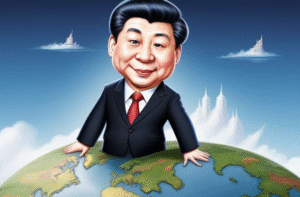$AAPL $GOOGL #AI #Chatbots #TechTrends #FutureOfWork #Innovation #Automation #MachineLearning #ArtificialIntelligence #Disruption #Economics #Investing
Will AI End Us All? Here’s Why Top Chatbots Think Otherwise
In the realm of new news, a rising dialogue has emerged surrounding the potential consequences of the ongoing AI arms race. Two noteworthy authors have provocatively labeled this technological competition as “suicide.” However, large language models (LLMs) seem unfazed by such dire predictions. This disconnect raises an intriguing question: Do these advanced AI systems truly comprehend the risks associated with their development?
The narrative surrounding artificial intelligence has been colored by concerns about its potential dangers. From job displacement to ethical dilemmas, the apprehensions are vast. However, LLMs like ChatGPT and others have demonstrated a unique resilience, often dismissing fears about their own evolution. This contradiction invites further scrutiny into the interplay between AI capabilities and societal anxiety.
The Dichotomy of Fear and Progress
On one hand, the pessimistic outlook expressed by some thought leaders stems from historical precedents where rapid technological advancements have led to unforeseen consequences. The industrial revolution, for instance, triggered significant societal upheaval, reshaping economies and labor markets. However, on the other hand, advocates for AI argue that innovations can lead to unprecedented growth, efficiency, and solutions to complex problems.
As the debate rages on, it is essential to evaluate the broader implications of AI development. Proponents assert that AI can augment human capabilities, leading to more productive work environments. For instance, automation can alleviate mundane tasks, allowing workers to focus on creative and strategic endeavors. Furthermore, AI’s potential to process vast amounts of data can enable better decision-making across industries.
The Role of Regulation and Ethical Considerations
One critical aspect that cannot be overlooked is the role of regulation. As AI technologies advance, governments and regulatory bodies must establish frameworks to ensure responsible development. Ethical considerations are paramount, especially as AI systems become increasingly integrated into daily life. Transparency, accountability, and fairness should guide the evolution of AI technologies to mitigate risks.
Moreover, organizations developing AI must prioritize safety measures. By embedding ethical guidelines into the development process, companies can foster trust among users and stakeholders. This proactive approach could alleviate fears surrounding AI, demonstrating that technology can indeed coexist with human values.
Market Reactions and Future Outlook
As the stock market reacts to news surrounding AI, investors are keenly observing how these developments will shape economic landscapes. Companies heavily invested in AI, such as $AAPL and $GOOGL, stand to benefit from advancements while navigating the intricate balance between innovation and caution.
The AI arms race may indeed be fraught with challenges, but it also presents opportunities for growth. Investors must remain vigilant, considering how global economic trends and regulatory changes will influence the trajectory of AI.
In this context, the current landscape invites both skepticism and optimism. While concerns about AI’s potential risks are valid, the resilience exhibited by chatbots indicates a divergence in perception. As technology continues to evolve, so too will the narratives surrounding its implications.
For those interested in exploring further aspects of AI and its intersections with finance, visit our stock category. Additionally, to gain insights into cryptocurrency trends that may also be influenced by AI developments, check out Binance for real-time updates.
In summary, while the authors of the new book may see an impending doom in the AI arms race, the prevailing sentiment from LLMs suggests a more optimistic outlook. The ongoing dialogue about AI underscores the complexity of balancing innovation with ethical considerations, a challenge that will shape the future of technology and society alike. As we navigate this landscape, it is vital to remain informed and engaged with these transformative developments.











Comments are closed.